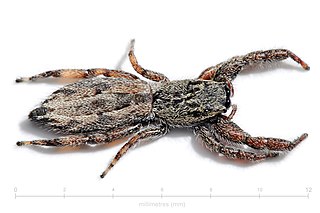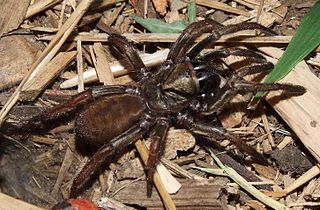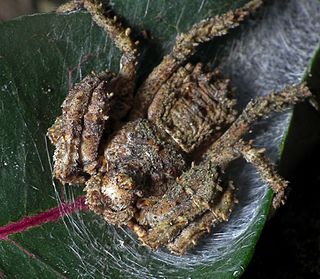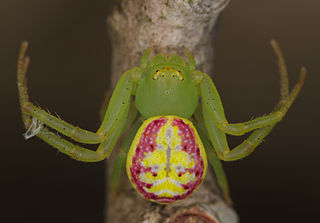
The Thomisidae are a family of spiders, including about 170 genera and over 2,100 species. The common name crab spider is often linked to species in this family, but is also applied loosely to many other families of spiders. Many members of this family are also known as flower spiders or flower crab spiders.

Holoplatys is a genus of the spider family Salticidae.

Idiopidae, also known as armored trapdoor spiders, is a family of mygalomorph spiders first described by Eugène Simon in 1889. They have a large body similar to tarantulas.

Barychelidae, also known as brushed trapdoor spiders, is a spider family with about 300 species in 42 genera.

Cheiracanthium, commonly called yellow sac spiders, is a genus of araneomorph spiders in the family Cheiracanthiidae, and was first described by Carl Ludwig Koch in 1839. They are usually pale in colour, and have an abdomen that can range from yellow to beige. Both sexes range in size from 5 to 10 millimetres. They are unique among common house spiders because their tarsi do not point either outward, like members of Tegenaria, or inward, like members of Araneus), making them easier to identify. The name is a reference to the backwardly directed process on the cymbium of the male palp. The species epithet is derived from the Greek Ancient Greek: χείρ, romanized: cheir, meaning "hand", and Acanthium, a genus of thorny-stemmed plants.

Arbanitis is a genus of Australian armoured trapdoor spiders that was first described by Ludwig Carl Christian Koch in 1874.

Sidymella is a genus of spider in the family Thomisidae, found in South America, Australia and New Zealand. It was originally named Sidyma, but this was later found to have been used already for a genus of moths.

Cymbacha is a genus of crab spiders that was first described by Ludwig Carl Christian Koch in 1874.
Idioctis is a genus of brushed trapdoor spiders that was first described by L. Koch in 1874.

Idiommata is a genus of brushed trapdoor spiders first described by Anton Ausserer in 1871. It is endemic to Australia.
Trittame is a genus of brushed trapdoor spiders first described by German arachnologist Ludwig Carl Christian Koch in 1874. It is endemic to Australia.
Dendrolycosa is a genus of nursery web spiders that was first described by Carl Ludwig Doleschall in 1859.

Hedana is a genus of crab spiders that was first described by Ludwig Carl Christian Koch in 1874.

Stephanopis is a genus of crab spiders first described by Octavius Pickard-Cambridge in 1869. It was erected for five then newly described species, including S. altifrons, from Australia. Stephanopis was characterized by the high cephalic region with unequally sized anterior eyes disposed in a strongly recurved row, opisthosoma ending in several spiniform projections and dorsoventrally depressed habitus. According to Pickard-Cambridge, the single specimen used for the description of S. altifrons was dry-pinned. Therefore the specimen could not be properly examined, so it was not possible to determine if the specimen was adult. Moreover, he states his own sketch of the spider as “hasty”. This may explain why the somatic characters were inadequately described, genitalic features were not mentioned at all, and the illustrations were not detailed enough, making the species unidentifiable.
Tharpyna is a genus of spiders in the family Thomisidae. It was first described in 1874 by L. Koch. As of 2017, it contains 12 species from Australia, India, and Indonesia.

Tharrhalea is a genus of crab spiders first described in 1875 by Ludwig Carl Christian Koch.
Australomisidia is a genus of spiders in the family Thomisidae. It was first described in 2014 by Szymkowiak. As of 2017, it contains 8 species, all from Australia.

Bomis is a genus of very small crab spiders, first described by German arachnologist Ludwig Carl Christian Koch in 1874. Five species are currently described, with three species from India and two from Australia.
Ozicrypta reticulata is a species of mygalomorph spider in the Barychelidae family. It is endemic to Australia. It was described in 1874 by German arachnologist Ludwig Carl Christian Koch.












